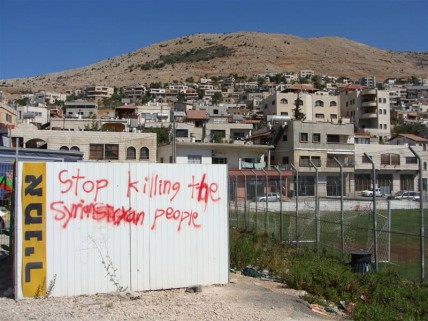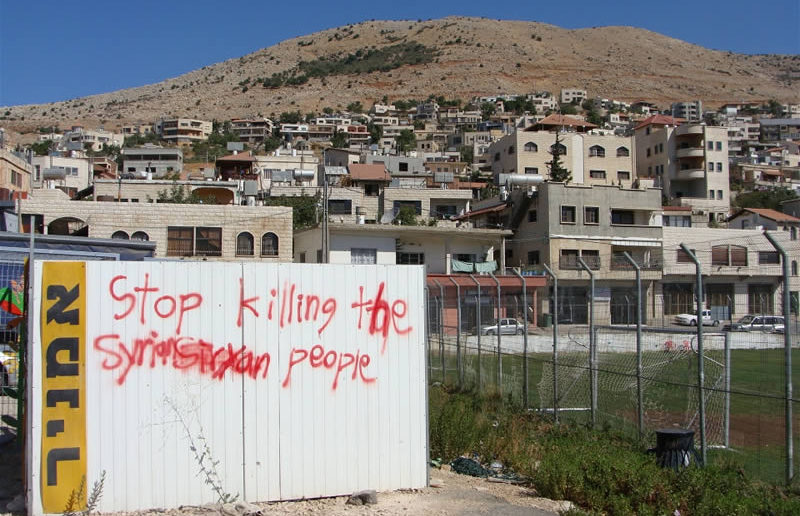
Majdal Shams, the largest Arab village, in the occupied Golan Heights. Photograph by Mya Guarnieri/IRIN
While conflict rages just kilometers away in Syria, the Israeli-occupied Syrian Golan Heights remains quiet. But there are signs that the 17-month old conflict has touched the areas’ Arab residents. In Majdal Shams, the area’s largest Arab village, blood-red graffiti reads: “Stop killing the Syrian people.”
When the conflict in Syria began last year, the Golan Heights was still largely supportive of Syrian President Bashar al-Assad, who is accused of killing thousands of Syrians in the fight against the rebels. Now, locals say it’s about a 50-50 split. But while the Druze communities become increasingly divided over the conflict in their homeland, they say they are determined to stay united in the face of the Israeli occupation of the Golan Heights. And some Arab residents feel that a change in Syria’s government could put the Golan back on the national and regional agenda.
Israel captured the Golan Heights during 1967 war, then unilaterally annexed the territory in 1981, a move that remains unrecognized by the international community and condemned by the UN. (Israel says it needs a presence in the Golan Heights to protect itself, arguing that UN Resolution 242, adopted after the 1967 war, recognizes Israel’s need for “secure” boundaries and does not require Israel to withdraw from all occupied territories. This interpretation is also disputed.)
Al-Marsad Arab Centre for Human Rights in the occupied Golan area reports that Israeli settlers receive five times the amount of water that the area’s Syrian farmers do. Land has been expropriated for Israeli settlements, and Arab residents pay more taxes to Israel than their Israeli counterparts while receiving fewer services.
Yet the Golan Heights “was not on the Syrian agenda for years,” according to Eyal Zisser, a professor in Tel Aviv University’s Department of Middle Eastern and African History and the author of four books about Syria and al-Assad. “Maybe a new regime in Damascus that will be more pro-Western will be ready to challenge Israel [and its occupation of]the Golan for real peace, something al-Assad did not dare to do,” he told IRIN.
Salman Fakhr Aldin, a coordinator at Al-Marsad, says a new government in Syria “whose primary concern is not the repression of its people” will not give up on either the Golan Heights or the occupied Palestinian territories.
But if Syrian rebels succeed in overthrowing al-Assad, they will face many challenges, analysts say, and confrontation with Israel may not be top of their priority list.
Shifting loyalties
The Arab residents of the Golan, most of whom belong to the Druze faith, still consider themselves Syrian. In the past, loyalty to Syria was often expressed by supporting al-Assad. Along with Syrian flags, residents carried framed pictures of al-Assad at protests against the Israeli occupation.
But Fakhr Aldin points out that not everyone carried those photos. He says he was always against al-Assad.
He says he opposes the Syrian leader for the same reasons that he opposes the Israeli occupation of the Golan and the Palestinian territories: “For me, [the central Syrian city of]Homs is like Gaza… People are demanding their basic human rights,” he says, “the right to live in honor, freedom and democracy. Who can say no?”
But like many locals, Fakhr Aldin is against Western intervention in Syria.
Some of the area’s regime supporters say it is less about al-Assad himself and more about concerns that an Islamist government – which some Druze fear would further oppress their minority group – could rise in his place.
Others warn against reducing the conflict to religious and sectarian differences, pointing out that minority groups, including the Druze, are participating in the rebellion, just as minorities are supporting al-Assad. “If it was just Alawites supporting al-Assad,” one Golan resident observed, “he wouldn’t still be in power.”
Divided communities
The Golan’s divided communities are trying to stay quiet about their opinions to keep peace in the area.
Still, protests against al-Assad have led to small skirmishes here in Majdal Shams. Several weeks ago, al-Assad supporters clashed with those supporting the rebellion. The two sides initially threw eggs at each other, which escalated into stone throwing. Village elders separated the groups and suggested that those who support the rebellion take their Friday protest elsewhere for a week so that the two sides could cool off.
A prominent member of the community, who spoke on the condition of anonymity because he has a number of close relatives in Syria, said: “In some houses, fathers aren’t speaking to sons and brothers aren’t talking to each other,” because they disagree about the conflict in Syria. But he denied media reports that locals who support the rebels were facing ostracism.
A new battleground?
Beyond inflaming differences among the Golan’s residents, a new regime in Damascus could introduce several risk factors for the Golan – and for Israel.
“Under al-Assad, there was a strong regime [in Syria],” Zisser explains. “The fall of his regime may lead to the spread of chaos… Some terrorist groups, mainly al-Qaeda, might look for new adventures once al-Assad is not there.”
Zisser likens a possible power vacuum in Syria to that in Egypt’s Sinai Peninsula. Since Egyptian President Hosni Mubarak was ousted from power, militants have attacked pipelines carrying gas from Egypt to Israel. On two occasions, they have also breached Israel’s border with Egypt. Last summer’s cross-border attack left eight Israelis dead.
But locals are less concerned about attacks on the Golan or the possibility that fighting in Syria could spill over the border. What they are troubled by is the possibility of an Israeli strike on Syria’s ally, Iran – and the regional war that could provoke.
A restaurant owner, who asked to remain anonymous, told IRIN that some locals are stocking up on non-perishable goods and water in case fighting breaks out. “We have seen so much fighting here,” he said with a sigh.
Even if such a war could result in the Golan being returned to Syria, he remarked: “We want the occupation to end. But violence is not our way.”




